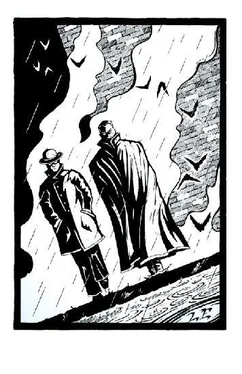I gripped the syringe, waiting until the thing was almost on me. Then I swung the needle around, jabbed it deep, and squeezed the plunger. By then the huge hands had grabbed me, throwing me down, pinning me to the floor beside the doorway. For a moment I flashed to my last memory of Reichenbach Falls, being pinned against a high ledge with a madman straddling my chest. My training in the eastern arts had served me then. I had been able to use my opponents force against him. But here the opposing weight was too great. I was at the mercy of the beast man, helpless to resist as it grabbed me tight and lifted me from the floor. Then, as it prepared to throw me across its back and carry me from the room, its face went slack. In a blink, we were both falling: beast man crashing against the base of the chair, me landing atop him.
My hip spasmed. I rolled away, forced myself into a crouch, and tried standing. The pain intensified. I slumped back against the chair, bracing myself while the servant breathed noisily, lying on its back, eyes open but seeing nothing.
The syringe and case had fallen near the chair. I crawled toward them. Nothing was broken, but still I resisted taking an injection, using my will to ignore the pain as I stood, crossed to the gigantic doorway, and entered the space within.
The way veered left, opening into a lighted corridor. The walls were stone, older than the wood-panelled rooms and halls behind me. But here, as before, the lights were electrical, bolted to the walls and trailing wires that snaked toward a chamber about twenty feet back from the forced-perspective room.
I paused, slipped the pharmaceutical case back into my pocket, and drew the pistol. Then I pushed on, watching the chamber’s interior come into view: tables strewn with strange instruments, walls affixed with snaking wires and twitching dials, air reverberating with the hum of unseen engines. And over all of it, becoming clearer as I passed through the doorway, a long shadow that could only belong to my host and saviour, the giant who called himself Adam.
“Impressive,” he said, speaking to me even before I had completely entered the room. “You do justice to your reputation. I can only hope that you do not think the same of me.”
I found him sitting with his back to the door. This time, I saw him as he was: a creature of astounding proportions, so large that I might have taken him for a statue. He kept his back to me, dabbing a bit of paint on an easel-mounted canvas. He was working on a reproduction of Pieter Brueghel’s Fall of Icarus , which he seemed to be painting from memory. The canvas, like the artist himself, was enormous.
“You may put the pistol back in your pocket.” He spoke without looking around. “I did not provide it to be used against me.” He lowered his brush, turned slowly, and gave me the benefit of his magnificent face, a countenance more like that of a god than a monster, with a complexion so uniform that it might have been fashioned from silk. No blemishes or scars, and yet the face filled with wrinkles as he smiled, seeming almost to shrivel as he flashed rows of marble teeth. He seemed pleased to see me. “So you have your answers, Mr. Holmes? Have you deduced who I am? What I am?”
“Yes. I think so.”
“Say it then. What am I? What is it they call me in the world I am hiding from? What is my name out there?”
“Frankenstein’s monster,” I said.
His smile broadened, wrinkles deepened. “Really? His monster? Not simply Frankenstein ?”
“I’ve heard that, too,” I said.
“And what about other things? How my father stitched me together from cadavers, gave me a criminal’s brain?”
“Yes,” I said. “I’ve heard that, though I don’t recall your father’s book mentioning such things.”
“People make their own versions,” he said. “Things become grander in the retelling; more sensational.”
“It’s much the same with stories about me,” I said. “I’m hardly the master of deduction that people think I am.”
“I wondered about that,” the creature said. “It’s why I decided to test you, gauge your resourcefulness, your commitment to solving a mystery. From what I can see, the reputation does you justice.” The creature stood, towering over me. “I need to show you something.” He turned, heading toward an antechamber and the sound of humming engines.
I followed.
“I understand that people don’t believe my father’s story,” he said. “Probably because so few of them have actually read his book.” He looked down at me. “But you have?”
“Yes,” I said.
“Did you believe it?” he asked. “Before tonight, before meeting me face to face, did you believe such things were possible?”
“No.” I said. “I took it for fiction.”
“But you did read the book?” he said, pressing the point that seemed to matter a great deal to him. “And you recall how my father became a student of the human form, its growth and decay? How he studied the dead to create life? Not to reassemble pieces that had once lived, but to make a new kind of man — wiser, stronger, more beautiful than any that had ever been born of natural means.”
“But by your father’s own account, the creature was neither wise nor beautiful.”
“Yes,” Adam said. “But that was his madness talking. He disowned me, and I suffered as a result. And he did, too. I saw to that. Before it was over, we had lured and pursued each other to the brink of ruin. I survived, but only by virtue of his handiwork. He had endeavoured to make me immortal, and so he had. In that, at least, he had succeeded.”
We crossed the threshold into the adjacent room, into the drone of compressors and electric current. Vats lined the walls, metal tanks that appeared to be fashioned from locomotive boilers, each fitted with portals too high for me to look through.
“Do you recall the part of my father’s story that deals with size?” he asked.
“You mean about the difficulties of working in human scale?”
“Yes.” He paused beside a portal. “I have the same problem.” He bent down, bringing his face level with mine. “I’ll show you.” He extended his hands. Together, they encircled my torso. “Do you trust me?”
I looked him in the eye and discerned no trace of malevolence. “All right,” I said.
He took hold, lifting me from the floor. I felt like Dante in the hands of Antaeus, putting my faith in a force that could crush me if it wished. But the grip was gentle, warm. I gave myself over to it as the giant man held me to a portal. Inside, I saw one of the orangutan creatures, like the servant I had left sedated in the library. It was naked but sexless. Indeed, the parts of its body that were human size lacked any detail at all. The arms and head, however, were fully realized.
“They are the best I’ve been able to do,” he said. “Their internal organs are no larger than yours, yet they fail quickly. I would give them normal-sized arms and heads, but I need servants who can think, speak, and use their hands. Until I can maintain function at smaller scales, I need to compromise.” He pulled me away from the portal, lowered me back to the floor. “I’m making progress,” he said. “One day I’ll be able to create servants who can travel freely through the world of ordinary men, go into town, procure supplies. Until then, I must make do with written correspondences and the trust of a few local business men.”
“They come here?” I asked, realizing there was no way he himself could blend inconspicuously with the company of men.
“Yes,” he said. “We meet in the library. It’s better that way. Some of them know the ruse. A few don’t. I trust, given the money they make on my investments, that none of them really care that I am a monster.”
Читать дальше












